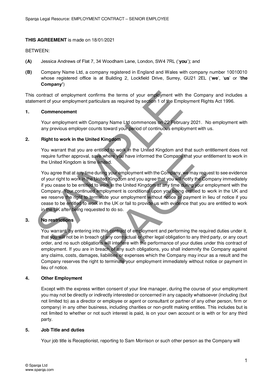 Our previous blogs discussed how to hire staff for your business, and what to do after hiring staff. Following on from this, we’re doing a deep dive into employment contracts, to make sure you prepare the correct contract to safeguard your business and ensure you and your employee are on the same page about their terms and conditions. This blog will guide you through the requirements to give employees written contracts and what to include in employment contracts for junior staff, senior or business-critical staff, and temporary staff. We will also advise on how to write terms and conditions in contracts to make sure they are not discriminatory.
Our previous blogs discussed how to hire staff for your business, and what to do after hiring staff. Following on from this, we’re doing a deep dive into employment contracts, to make sure you prepare the correct contract to safeguard your business and ensure you and your employee are on the same page about their terms and conditions. This blog will guide you through the requirements to give employees written contracts and what to include in employment contracts for junior staff, senior or business-critical staff, and temporary staff. We will also advise on how to write terms and conditions in contracts to make sure they are not discriminatory.
Keep an eye out for our next blogs in this series, which will cover when an employee should receive a contract, and whether an employment contract can be changed.
Providing written employment contracts
Employers are legally required to provide every employee and casual worker with a written statement of the basic terms of their employment. This should be given to them on or before their first day of work.
There’s no specific requirement to how you set out these written terms, but an employment contract is useful for providing all required information. Generally, it is best practice to give employees a full written employment contract to ensure the terms are clear.
A good employment contract will go beyond outlining the basic written terms of employment that the law requires, and additional terms may depend on the type of employee you are hiring. For example, for more senior employees, you might choose to add restrictions on them leaving to work for a competitor, longer notice period or option to put them on garden leave.
If written employment terms are not provided, the prospective employee can apply to the Employment Tribunal for a finding of what their basic terms of employment are and compensation.
See our templates for specific contracts depending on the seniority of your employee:
- Service Agreement for a director
- Employment Contract – Senior Employee
- Employment Contract – Junior Employee
- Contract – Casual Worker
What to include in employment contracts
Contracts for employees must include a written statement of certain terms of employment. By law, there are minimum terms that must be included:
- the names of the employer and employee;
- the date the employment starts and the date the employee’s period of continuous employment begins;
- how much the employee will be paid, or how their pay will be calculated, and how regularly they will be paid;
- what the expected working hours are and the place of work, including whether the employee may be required to work outside the UK;
- holiday entitlement and holiday pay (including bank and public holiday entitlement);
- the employee’s job title and a brief description of their work;
- terms about absence due to incapacity and sick pay;
- the notice period that the employee must give to end their employment and the notice that you must give them if you want to do so;
- terms about pensions and pension schemes;
- information about disciplinary and grievance procedures;
- details of any collective agreements with trade unions affecting the employment;
- information about probationary periods, including any conditions attached to it and how long it lasts; and
- details of any training entitlement, including whether it is mandatory or if this is something your business will pay for.
Note that the above points reflect what should be included in employment contracts from 6 April 2020 and may not apply to employment contracts issued before then.
For full details on requirements for a written employment contract, see our Q&A.
Employment agreements for junior employees
Apart from the list mentioned in the section above, it is generally up to you what to include for junior or new employees.
In any contract for a new member of staff, consider including a probationary period. A probationary period is a period of time during the beginning of an employment relationship where new hires can be dismissed with less notice. You can choose how long to make the notice period, though it is usually one, three, or six months, depending on the nature of the job. A probationary period is also a time to actively monitor the new employee’s performance.
Employment agreements for senior employees
In addition to the list mentioned in the section above for general employment contracts, it is beneficial to consider more detailed terms in contracts for senior or business-critical employees.
You would usually want a longer notice period for a senior employee so that you will have time to prepare for a transition if they leave your business. You also may want to go into more detail about when your business can terminate the contract.
As these are more senior staff, you may want to seriously think about protecting your business interests in the event that they leave. One way to do this is to include a confidentiality clause in your contract restricting their use of confidential information both during and following their employment by you. Another method is a non-compete clause restricting them from working with any competitor or setting up their own competing business/practice for a specified time after they leave your employment.
This confidentiality clause and non-compete clause can be included in the employment contract or a separate confidentiality and non-disclosure agreement.
Employment contracts for temporary and part-time employees
You must make sure that employment contracts for temporary and part-time employees are just as favourable as for permanent employees in a similar position. Comparable employees are those doing the same or broadly similar work at the same place of work. For example, a fixed-term or temporary employee should get the same pay or benefits as a comparable full-time employee, pro-rated for their working hours. An exception to this should only be allowed where it is necessary to include less favourable terms for a real business reason and this has been balanced against the impact on the employee before deciding to treat them differently.
Writing employment contracts that do not discriminate
Your business must ensure that employees with protected characteristics are not given less favourable terms in their contracts.
Do the following to ensure employment contracts aren’t discriminatory:
- treat all comparable employees equally (see Staff pay for the rules on this);
- do not offer different terms to different groups of employees that disadvantage one group more than another; and
- bear in mind that there is a limited legal exception which permits you to discriminate indirectly if you can justify it as an appropriate and necessary way of achieving a genuine aim.
The content in this article is up to date at the date of publishing. The information provided is intended only for information purposes, and is not for the purpose of providing legal advice. Sparqa Legal’s Terms of Use apply.

Marion joined Sparqa Legal as a Senior Legal Editor in 2018. She previously worked as a corporate/commercial lawyer for five years at one of New Zealand’s leading law firms, Kensington Swan (now Dentons Kensington Swan), and as an in-house legal consultant for a UK tech company. Marion regularly writes for Sparqa’s blog, contributing across its commercial, IP and health and safety law content.






